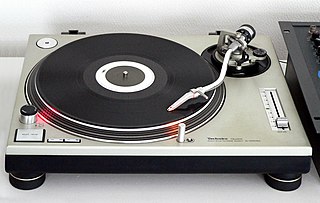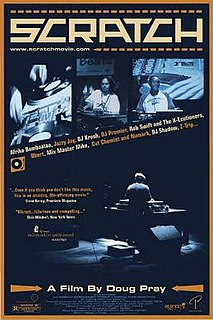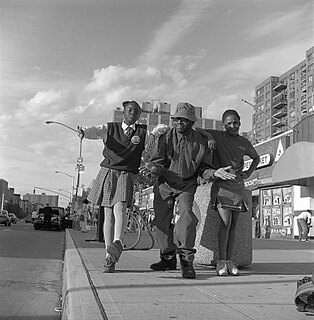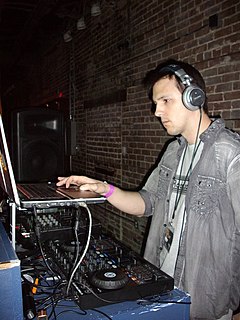Related Research Articles

A disc jockey, more commonly abbreviated as DJ, is a person who plays recorded music for an audience. Types of DJs include radio DJs, club DJs, mobile DJs, and turntablists. Originally, the "disc" in "disc jockey" referred to shellac and later vinyl records, but nowadays DJ is used as an all-encompassing term to also describe persons who mix music from other recording media such as cassettes, CDs or digital audio files on a CDJ, controller, or even a laptop. DJs may adopt the title "DJ" in front of their real names, adopted pseudonyms, or stage names.

Scratching, sometimes referred to as scrubbing, is a DJ and turntablist technique of moving a vinyl record back and forth on a turntable to produce percussive or rhythmic sounds. A crossfader on a DJ mixer may be used to fade between two records simultaneously.
A battle record, also often called a battle tool or battle breaks, is a vinyl record made up of brief samples from songs, film dialogue, sound effects, and drum loops for use by a DJ. The samples and drum loops are used for scratching and performances by turntablists. The most famous example of this format is Super Duck Breaks, a 1996 release by "The Turntablist," a pseudonym of DJ Babu.

Turntablism is the art of manipulating sounds and creating new music, sound effects, mixes and other creative sounds and beats, typically by using two or more turntables and a cross fader-equipped DJ mixer. The mixer is plugged into a PA system for live events and/or broadcasting equipment so that a wider audience can hear the turntablist's music. Turntablists manipulate records on a turntable by moving the record with their hand to cue the stylus to exact points on a record, and by touching or moving the platter or record to stop, slow down, speed up or, spin the record backwards, or moving the turntable platter back and forth, all while using a DJ mixer's crossfader control and the mixer's gain and equalization controls to adjust the sound and level of each turntable. Turntablists typically use two or more turntables and headphones to cue up desired start points on different records.

A direct-drive turntable is one of the three main phonograph designs currently being produced. The other styles are the belt-drive turntable and the idler-wheel type. Each name is based upon the type of coupling used between the platter of the turntable and the motor.

Scratch is a 2001 documentary film, directed and edited by Doug Pray. The film explores the world of the hip-hop DJ from the birth of hip-hop when pioneering DJs began extending breaks on records, to the invention of scratching and beat juggling, to the more recent explosion of turntablism. Throughout the documentary, many artists explain how they were introduced to hip-hop while providing stories of their personal experiences.

Derek Showard, better known by the stage name GrandMixer DXT, is an American musician, one of the earliest to use turntables as a musical instrument in the 1980s.
Back spinning describes the act of manually manipulating a vinyl record, using enough force to cause the record to spin backward. It is often used in DJing; many DJs use specialty slipmats so that friction will be reduced between the record and the platter. Back spinning is used to "rewind" the sound on a record to a previous point in the audio, to slip cue or cut music mixed live by a DJ, or in beat juggling.

Hip hop or hip-hop is a culture and art movement that was created by African Americans, Latino Americans and Caribbean Americans in the Bronx, New York City. The origin of the name is often disputed. It is also argued as to whether hip hop started in the South or West Bronx. While the term hip hop is often used to refer exclusively to hip hop music, hip hop is characterized by four key elements: "rapping", a rhythmic vocal rhyming style (orality); DJing, which is the practice of making music with record players and DJ mixers ; b-boying/b-girling/breakdancing (movement/dance); and graffiti. Other elements are: hip hop culture and historical knowledge of the movement (intellectual/philosophical); beatboxing, a percussive vocal style; street entrepreneurship; hip hop language; and hip hop fashion and style, among others. The fifth element, although debated, is commonly considered either street knowledge, hip hop fashion, or beatboxing.

A DJ mixer is a type of audio mixing console used by disc jockeys (DJs) to control and manipulate multiple audio signals. Some DJs use the mixer to make seamless transitions from one song to another when they are playing records at a dance club. Hip hop DJs and turntablists use the DJ mixer to play record players like a musical instrument and create new sounds. DJs in the disco, house music, electronic dance music and other dance-oriented genres use the mixer to make smooth transitions between different sound recordings as they are playing. The sources are typically record turntables, compact cassettes, CDJs, or DJ software on a laptop. DJ mixers allow the DJ to use headphones to preview the next song before playing it to the audience. Most low- to mid-priced DJ mixers can only accommodate two turntables or CD players, but some mixers can accommodate up to four turntables or CD players. DJs and turntablists in hip hop music and nu metal use DJ mixers to create beats, loops and "scratching" sound effects.

Vestax Corporation was a Japanese musical instrument, turntable and audio equipment firm founded by Hidesato Shiino in 1977. The company started by designing and manufacturing electronic guitars. In the 1980s, Vestax produced multitrack recorders and later moved to making DJ mixers, professional turntables, compact disc players and signal processors. Debt troubles lead to the company's bankruptcy at the end of 2014.

Hip hop production is the creation of hip hop music in a recording studio. While the term encompasses all aspects of hip hop music creation, including recording the rapping of an MC, a turntablist or DJ providing a beat, playing samples and "scratching" using record players and the creation of a rhythmic backing track, using a drum machine or sequencer, it is most commonly used to refer to recording the instrumental, non-lyrical and non-vocal aspects of hip hop.

Rob Swift, is an American hip hop DJ and turntablist. He was an original member of the turntablist group The X-Ecutioners until 2004. He has also released numerous solo albums and collaborated with various artists, including Mike Patton, Patton's project Peeping Tom, Dan the Automator and Handsome Boy Modeling School, Lords of Acid, Portugal. The Man, and Herbie Hancock.
A DJ mix or DJ mixset is a sequence of musical tracks typically mixed together to appear as one continuous track. DJ mixes are usually performed using a DJ mixer and multiple sounds sources, such as turntables, CD players, digital audio players or computer sound cards, sometimes with the addition of samplers and effects units, although it is possible to create one using sound editing software.

In music, sampling is the reuse of a portion of a sound recording in another recording. Samples may comprise elements such as rhythm, melody, speech, sounds, or entire bars of music, and may be layered, equalized, sped up or slowed down, repitched, looped, or otherwise manipulated. They are usually integrated using hardware (samplers) or software such as digital audio workstations.

Controllerism is the art and practice of using musical software controllers, e.g. MIDI, Open Sound Control (OSC), joystick, etc., to build upon, mix, scratch, remix, effect, modify, or otherwise create music, usually by a Digital DJ or Live PA performer, often called a "controllerist". Controllerism is also a nod to traditional musicianship and instrumental-ism paired with modern computer sequencing software such as Ableton Live and Native Instruments Traktor. However a working knowledge of scales and chords is not necessarily required as the performers typically focus their efforts more on sequencing events, software effect and instrument manipulations using buttons, knobs, faders, keys, foot switches and pedals than on instrumental notes played in real time. With recent developments in music technology, particularly in software instruments, a USB MIDI controller enables musicians almost unlimited possibilities to control a wide variety of sound types.

Joseph Saddler, popularly known by his stage name Grandmaster Flash, is a Barbadian-American DJ and rapper. He is considered to be one of the pioneers of hip hop DJing, cutting, scratching and mixing. Grandmaster Flash and the Furious Five were inducted into the Rock and Roll Hall of Fame in 2007, becoming the first hip hop act to be honored. In 2019 he won the Polar Music Prize.
Gee Bayss is one of the pioneer DJs in West Africa. Member of the group, Pee Froiss, he toured throughout the world with his sure-fire turntablism which had crowds jumping whenever the group was performing. Combining solo projects with international tours of the Pee Froiss, Gee Bayss is actively engaged in transmitting his deejaying art to the younger generations.
Sampledelia is sample-based music which uses samplers or similar technology to expand upon the recording methods of 1960s psychedelia. Sampledelia features "disorienting, perception-warping" manipulations of audio samples or found sounds via techniques such as chopping, looping or stretching. Sampladelic techniques have been applied prominently in styles of electronic music and hip hop, such as trip hop, jungle, post-rock, and plunderphonics.

DJing is the act of playing existing recorded music for a live audience.
References
- ↑ Justin A. Williams (12 February 2015). The Cambridge Companion to Hip-Hop. Cambridge University Press. p. 46. ISBN 978-1-107-03746-5.
- ↑ Mark Katz (5 July 2012). Groove Music: The Art and Culture of the Hip-Hop DJ. Oxford University Press. p. 8. ISBN 978-0-19-533112-7.
- ↑ Bill Brewster (14 January 2014). Last Night a Dj Saved My Life: The History of the Disc Jockey. Grove/Atlantic, Incorporated. pp. 283–. ISBN 978-0-8021-4610-6.